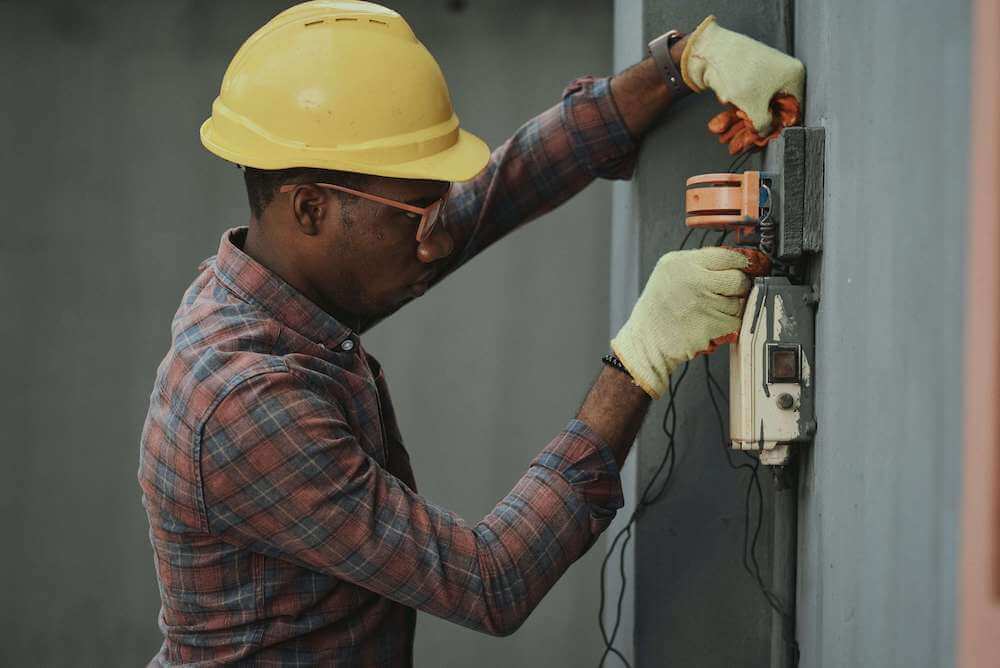
Financial aid (may be available)

Financial aid (may be available)

No cost info

Financial aid (may be available)

No cost info

Financial aid (may be available)

No cost info
No cost info
The main focus for Electricians is to install, repair and maintain electrical power, lighting, communications and control systems in businesses, homes and factories. Our online electrician trade classes begins with the basics of communication, bidding, records and ethics. Then moves on to the career focused subjects of safety for Electricians, electrical circuits, the National Electric Code® and much more.
$1,239 total
Licensed electricians are skilled professionals that fulfill a vital role, and the opportunities for growth and success are virtually limitless. And although the education and training process takes some time and effort, there’s no doubt that it’s absolutely worth it.
Here’s more good news: now, there are more options than ever to make electrician training as accessible and convenient as possible. As a result, you can find many ways to fit the required courses into your schedule. Independent Electrical Contractors Rocky Mountain (IECRM) offers online classes for electrician training, so you can take the first steps toward your future career without even leaving your home.
No cost info
Electrical work has some of the best opportunities for career stability, especially for residential technicians. If you want to start a career in electrical work, this 100% online course will prepare you for an entry-level residential electrician apprenticeship.
No cost info
Our Online Electrician Training courses align with the National Electric Code (NEC) to help you develop the safe, electrician skills employers demand. That includes electrical equipment installation and tool usage, basic electricity and AC current theory, and a wide range of installation procedures for both residential and commercial properties.
No cost info
Omaha, Nebraska, is a thriving city with a promising job market for aspiring electricians. The city's growing economy and infrastructure development have created a high demand for skilled electrical professionals. If you're considering becoming an electrician, Omaha offers a variety of electrician schools that can help you achieve your goals. By enrolling in a reputable electrician school, you can earn a competitive electrician salary and take the first step towards a rewarding career in the electrical industry.

An electrician is a skilled professional who specializes in the installation, maintenance, and repair of electrical systems. They are responsible for ensuring that electrical wiring, equipment, and fixtures are installed and functioning safely and efficiently. Electricians work in a variety of settings, including residential, commercial, and industrial environments.
To become an electrician in Omaha, you typically need to complete a combination of formal education and on-the-job training. This often includes completing an apprenticeship program, which combines classroom instruction with hands-on experience under the supervision of experienced electricians.
The fastest path to becoming an electrician in Omaha is through a vocational or technical school program. These programs can be completed in as little as one to two years, depending on the specific program and the student's prior experience. Upon completion of the program, students can then pursue an apprenticeship or entry-level position in the field.
Omaha offers several electrician classes and programs to choose from, each with its own unique features and requirements. Here are a few examples:
Metropolitan Community College (MCC) offers an Electrical Technology program that prepares students for careers as electricians. The program can be completed in two years and includes both classroom instruction and hands-on training. The program covers topics such as electrical theory, blueprint reading, and the National Electrical Code. Graduates of the program can then pursue an apprenticeship or entry-level position in the field.
The Nebraska Electrical JATC (Joint Apprenticeship and Training Committee) offers a five-year apprenticeship program that combines classroom instruction and on-the-job training. The program is designed to provide students with the knowledge and skills needed to become a licensed electrician. Applicants must be at least 18 years old and have a high school diploma or GED.
The Omaha Electrical Training Center is a non-profit organization that provides electrical training and education. The center offers a four-year apprenticeship program that includes both classroom instruction and hands-on training. Graduates of the program can then take the exam to become a licensed electrician.
While there are no fully online electrician programs available in Omaha, some schools do offer hybrid or blended learning options that combine online coursework with in-person training. Additionally, there are no free electrician programs in Omaha, as the training and education required to become an electrician typically come with a cost.
In Omaha, electricians must be licensed by the state of Nebraska in order to work. The certification process typically involves completing an apprenticeship program, passing a written exam, and demonstrating practical skills through a hands-on assessment.
Omaha's job market for electricians is strong, with a variety of potential employers, including construction companies, electrical contractors, and industrial facilities. According to the U.S. Bureau of Labor Statistics, the average electrician salary in Omaha is around $60, 000 per year.
Becoming an electrician in Omaha can be a rewarding career path, with ample job opportunities and the potential for a competitive salary. By enrolling in a reputable electrician school, you can gain the knowledge and skills needed to succeed in this in-demand field. Whether you choose a vocational program, an apprenticeship, or a combination of both, Omaha offers a variety of options to help you become a skilled and licensed electrician.
If this article doesn't match what you're looking for, you can check out these other articles:
Dreambound's platform allows prospective students to find the right educational program for them through searching, filtering, and connecting with our extensive selection of career & technical education partners.
Dreambound has over 70 programs across healthcare, technology, business, and industrial trades. This includes programs such as Medical Billing, Cybersecurity, and welding.
Some of our schools offer financial aid for those who qualify. Many others offer payment plans, where you can pay the cost of class over time.
Yes, Dreambound offers many online programs. On Dreambound's search, you can filter by online, in-person, and hybrid (part online, part in-person).
Dreambound is completely free for you to use! We are supported by schools and organizations who pay to advertise on our website, so we can offer all of our career resources for free.